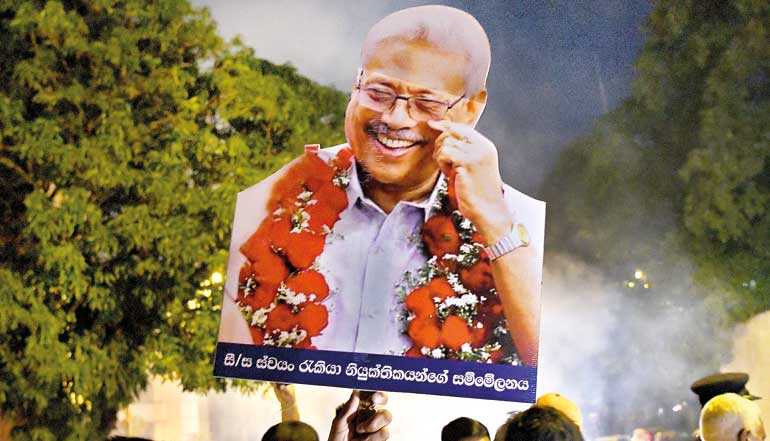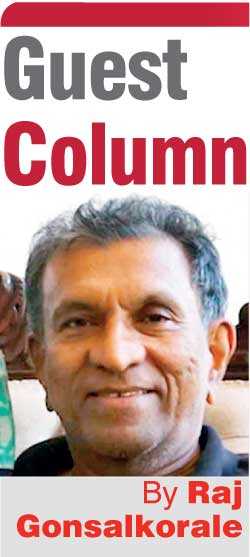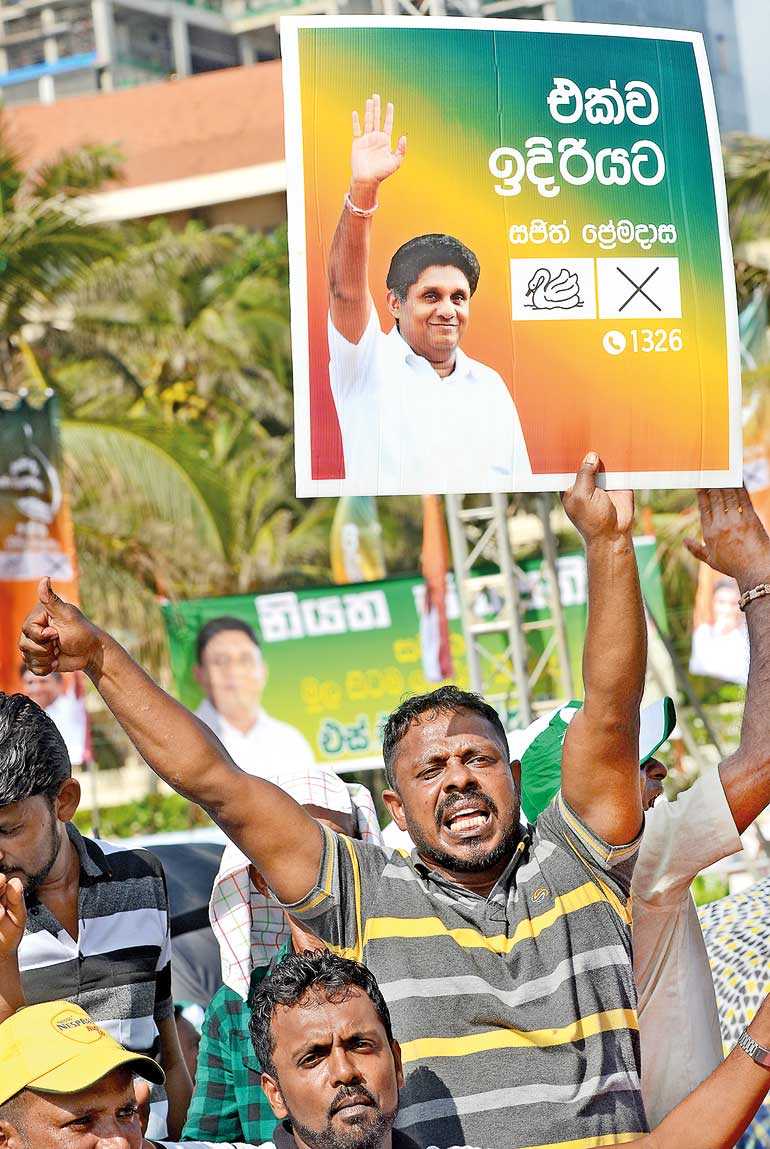Tuesday Feb 24, 2026
Tuesday Feb 24, 2026
Tuesday, 22 October 2019 01:00 - - {{hitsCtrl.values.hits}}

Both candidates need to articulate their plans, and not mouth motherhood statements about taking the country to dizzy fairy-tale heights. Specifics are needed now, as Sri Lanka has an intelligent voter base who will understand such an economic recovery plan. The Presidency is the symbol of the country, and whoever who wins must be good enough to be that symbol who can rally the country behind him - Pix by Shehan Gunasekara
The two main contenders for the Presidency of Sri Lanka are Gotabaya Rajapaksa and Sajith Premadasa. That is stating the obvious. No doubt, some others may have a limited impact on the outcome. Minority votes may benefit Premadasa, while the Sinhala Buddhist vote would benefit Rajapaksa. The Catholic vote has been traditionally with the UNP, but this time, the failure of the Government to prevent the Easter Sunday massacre despite many warnings is likely to swing a considerable number of Catholic votes to Rajapaksa.
 The vote count may not be as comfortable for Rajapaksa, as his camp has been projecting with SLPP and SLFP numbers. It would be inadvisable for them to assume victory on the basis of this arithmetic. Their campaign, however, appears far more organised and efficient than Premadasa’s.
The vote count may not be as comfortable for Rajapaksa, as his camp has been projecting with SLPP and SLFP numbers. It would be inadvisable for them to assume victory on the basis of this arithmetic. Their campaign, however, appears far more organised and efficient than Premadasa’s.
It is common knowledge that Ranil Wickremesinghe had to be virtually pulled back by force from trying to become the DNF candidate. This is about the third time it has happened. First with Sarath Fonseka, then with Maithripala Sirisena, and now, with Sajith Premadasa. The third time, luck didn’t come his way.
His grudging acceptance of Premadasa cannot make Wickremesinghe an ardent supporter of the latter. There are others who are supporters of Wickremesinghe who opposed Premadasa and been opposing him for a long time, who are now bear-hugging Premadasa on stage. They, however, reportedly agreed to support Premadasa on the condition that Wickremesinghe becomes the Prime Minister under a Premadasa presidency.
In the hustings, Rajapaksa has been consistent with his messages, whereas Premadasa has been at times very articulate and presented speeches of substance, while at other times, he very likely has regretted the speeches he has made, on account of their mundane hollowness
To complicate matters, there are Premadasa supporters, with one particular Minister known to be angling for the Prime Minister’s job under a Premadasa presidency. This, and the two strong camps scenario, could result in considerable instability, infighting, and jockeying for positions, should Premadasa win on 16 November.
Premadasa has stated he will “retire” many politicians from his Cabinet, and infuse younger, untainted, and uncorrupted blood. A noble thought, although he must know that he can only allocate Ministries, and not select Ministers, under the 19th Amendment. The Prime Minister picks the Ministers, and the President appoints them on the advice of the Prime Minister.
As stated, such a situation is not evident in the Rajapaksa camp. Mahinda Rajapaksa is the unchallenged strongman, and Gotabaya will play second fiddle to him, even as President. The family would have sorted the post-election modus operandi, should Rajapaksa win.
In the hustings, Rajapaksa has been consistent with his messages, whereas Premadasa has been at times very articulate and presented speeches of substance, while at other times, he very likely has regretted the speeches he has made, on account of their mundane hollowness. He has also opened himself for criticism, by trying to project the image of the son of an illustrious President, who did so much for the country and who is loved by millions, as one of his main qualifications, if not the most important one.
Little does he recognise that his father is not revered by millions, and in fact, the darker side of the man, reputedly the person who gave orders for the killing of thousands of people suspected of being JVP members or JVP supporters during the 1986-1989 period, is more likely feared and even hated by a large number of people. Premadasa senior’s alignment with the LTTE and the JVP to attack the IPKF, with the subsequent falling out with both, is now being constantly reminded to the voters by the Rajapaksa camp. Less of the senior and more of the junior would have benefited Premadasa.

Whoever who wins, there are some fundamentals that the country deserves and has to have, considering the precipice it has fallen into now. Economic recovery is a prime need, and considering the lowering of the GDP to 2.9% by the IMF, and no economic recovery plan being articulated by the current Government or the Presidential candidate Premadasa, the fears amongst many that the economy will deteriorate even further are not unjustified.
Both candidates need to articulate their plans, and not mouth motherhood statements about taking the country to dizzy fairy-tale heights. Specifics are needed now, as Sri Lanka has an intelligent voter base who will understand such an economic recovery plan. If the candidates take a few taxi rides in cars or three-wheelers, they will meet many such intelligent people who drive these taxis, who could teach a thing or two to the politicians and even economists.
An economic plan should inform the public, particularly local and foreign investors, what sectors will be the focus of the economic plans. Investors will look for incentives for them to invest. A sustainable economic recovery cannot be achieved through various promises and pointless statements like “I will usher in safety and prosperity to every citizen of the country”. Should this attract anyone’s vote?
An economic plan should inform the public, particularly local and foreign investors, what sectors will be the focus of the economic plans. Investors will look for incentives for them to invest. A sustainable economic recovery cannot be achieved through various promises and pointless statements like “I will usher in safety and prosperity to every citizen of the country”. Should this attract anyone’s vote? Both candidates must be more specific, so that the present generation could be comforted about their future, as well as the future of the next generation and the ones to follow.
The candidates also must present responsible plans and how they will fund the implementation of such plans. Gotabaya Rajapaksa has stated that he will ensure all students passing their A/L exams will receive a higher education. A very noble promise; however, he needs to articulate how he is going to do this.
Both have become the champions of every sector now, without providing details of what they are going to do and how they are going to do it. To be fair by Gotabaya Rajapaksa, he has been more specific on promises than his contender Sajith Premadasa. The latter’s Viyath Maga project has been gathering ideas for the last four years, and no doubt those ideas could well be the key planks of his manifesto. Investment in tourism; infrastructure; agriculture; industry, particularly in light engineering; shipping; knowledge management; education; and health are all avenues for an economic recovery. However, some specifics are needed for the voters to have the confidence as to whose plans are more realistic, and will deliver the dividends people need.
Besides the absolute need for an economic recovery, the country also needs to recover from the morass it is in with regard to its standards and practices relating to ethical and moral behaviour. Some have likened the ethical and moral standards of the country to what is witnessed in the world of alley cats, with the bulk of politicians of the country being at the top of this heap of alley cats.
Politicians and others who have descended to such low levels are unlikely to mend their ways willingly. They have forsaken principles for power and political expediency, and have shown shameful behaviour while pretending to be virtuous and righteous. One has to question the real motives of many from the highest in the land who, while doing their utmost behind the scenes to be in power, and running a ruinous Government, turn a new leaf of neutrality when their relentless efforts fail.
Such politicians will not change, and they only display the characteristics of chameleons. The 19th Amendment has made the Executive President somewhat toothless. The Prime Minister has effective power, and he or she shares this power with Parliament, and the President is responsible to Parliament under the 19th Amendment. Both candidates may crow about powers they really do not have. Both have to work with the person who will have the power, the Prime Minister. In Rajapaksa’s case, elder brother and former President Mahinda Rajapaksa will be the Prime Minister, as he himself has stated, while the country does not know who will be the Prime Minister in the event of a Premadasa victory.
At the General Election that will follow the Presidential Election, the voters will have an opportunity to chase away the chameleons currently occupying the august building on Diyawanna Oya. One can only hope the voters will not elect another set of chameleons.
Investment in tourism; infrastructure; agriculture; industry, particularly in light engineering; shipping; knowledge management; education; and health are all avenues for an economic recovery. However, some specifics are needed for the voters to have the confidence as to whose plans are more realistic, and will deliver the dividends people need
It is Parliament that can determine whether the country will lift itself from the morass it is in, while the President elected on 16 November hopefully will lead the way, and begin the process of cleaning up the mess. Clean cities do not reflect the inner cleanliness of the people, and the job of the President is to demonstrate inner cleanliness and project such an image as an example to the people. Who is better suited and whose team is better suited to do this is what the voters should decide on 16 November.
However, given the low breed of politicians the country has, the one thing that can safeguard the ordinary people of the country is the law of the land, how it is applied, and who applies it. If this system is corrupted, then, Sri Lanka will slide further down the slope. This system therefore has to be above the politics of the country. Its independence will decide its integrity. The President is the symbol of the country, and whoever who wins must be good enough to be that symbol who can rally the country behind him.